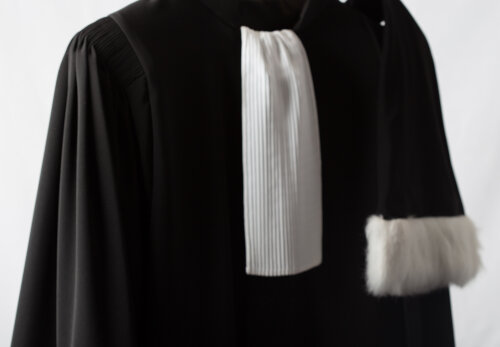Best Faith-Based Law Lawyers in France
Share your needs with us, get contacted by law firms.
Free. Takes 2 min.
Or refine your search by selecting a city:
List of the best lawyers in France
About Faith-Based Law in France
Faith-Based Law in France pertains to the legal considerations and guidelines that accommodate the diverse religious practices and beliefs within the society. France, a secular state, enforces the principle of laïcité, which implies a distinct separation between religion and state. This ensures that the public realm remains neutral, providing equal treatment irrespective of one's faith. Yet, various laws exist to support religious freedom, allowing individuals to practice their religion freely, as long as it doesn't infringe on others' rights or contradict public policy standards.
Why You May Need a Lawyer
There are numerous circumstances where individuals might seek legal assistance in matters of Faith-Based Law in France. These include but are not limited to:
- Resolving conflicts between religious practices and state laws, particularly in schools or workplaces.
- Ensuring religious rights are respected, such as the right to wear religious symbols.
- Handling disputes related to faith-based marriages, divorces, and inheritance issues.
- Navigating the legal intricacies for faith-related organizations, such as establishing a religious association.
- Addressing issues of discrimination or intolerance based on religious beliefs.
Local Laws Overview
Key aspects of local laws relevant to Faith-Based Law in France include:
- The 1905 Law on the Separation of the Churches and the State, which is central to understanding laïcité.
- Provisions under the French Civil Code that address family law issues from a secular perspective but can intersect with religious customs.
- Regulations on wearing religious symbols in public institutions, especially schools, which are governed by the 2004 Law banning conspicuous religious symbols in schools.
- Legal frameworks for establishing religious associations under the 1901 Law.
Frequently Asked Questions
What is laïcité?
Laïcité is the French concept of secularism, emphasizing the separation of religion from government and public life, ensuring freedom of religion and belief everywhere in the country.
Can I legally wear religious symbols in public in France?
Yes, you can wear religious symbols; however, the law restricts wearing conspicuous religious symbols in public schools and some public service roles to ensure laïcité.
Are there specific laws governing religious marriages?
Religious marriages are recognized as ceremonial. For a marriage to be legally binding, a civil ceremony must be conducted first under French law.
How are faith-based organizations regulated in France?
Faith-based organizations can operate as associations under the 1901 Law, but they must adhere to secular principles and not contravene public policy.
What happens when religious law conflicts with civil law in family disputes?
Civil law prevails in France; however, parties may incorporate terms into family agreements that respect religious practices, as long as they conform to national law.
How can religious discrimination be addressed legally?
Discrimination based on religion is prohibited by French law. Victims can seek redress through legal channels, filing complaints with relevant authorities or pursuing court action.
Is there room for faith-based arbitration in legal disputes?
While unofficial faith-based arbitration can occur, all decisions must comply with French civil laws for them to be enforceable by the courts.
How does French law affect religious education?
Religious education is primarily conducted in private; public schools focus on secular education in accordance with state mandates.
Can I home-school my children with a religious curriculum?
Yes, home-schooling is permitted, but it must adhere to the national education standards while incorporating religious teachings privately.
What legal measures protect against religious hate speech?
French law strictly prohibits hate speech, including that which is religiously motivated, providing mechanisms for legal recourse against perpetrators.
Additional Resources
For more information or legal assistance regarding Faith-Based Law in France, consider contacting the following:
- The French Department of Justice for legal guidelines on religious freedom.
- La Défenseur des Droits (The Defender of Rights) for issues related to discrimination.
- The HALDE (High Authority against Discrimination and for Equality) for addressing discrimination concerns.
- Local Bar Associations for referrals to qualified legal practitioners.
Next Steps
If you find yourself in need of legal assistance in Faith-Based Law, consider taking the following steps:
- Clearly document your situation, gathering all relevant information and evidence.
- Seek initial guidance from an organization experienced in Faith-Based Law.
- Contact a specialized attorney through local bar associations for personalized legal advice.
- Consider attending informational sessions or workshops that may offer valuable insights and assistance.
By understanding your rights and available resources, you can navigate the complexities of Faith-Based Law in France with confidence.
Lawzana helps you find the best lawyers and law firms in France through a curated and pre-screened list of qualified legal professionals. Our platform offers rankings and detailed profiles of attorneys and law firms, allowing you to compare based on practice areas, including Faith-Based Law, experience, and client feedback.
Each profile includes a description of the firm's areas of practice, client reviews, team members and partners, year of establishment, spoken languages, office locations, contact information, social media presence, and any published articles or resources. Most firms on our platform speak English and are experienced in both local and international legal matters.
Get a quote from top-rated law firms in France — quickly, securely, and without unnecessary hassle.
Disclaimer:
The information provided on this page is for general informational purposes only and does not constitute legal advice. While we strive to ensure the accuracy and relevance of the content, legal information may change over time, and interpretations of the law can vary. You should always consult with a qualified legal professional for advice specific to your situation.
We disclaim all liability for actions taken or not taken based on the content of this page. If you believe any information is incorrect or outdated, please contact us, and we will review and update it where appropriate.
Browse faith-based law law firms by city in France
Refine your search by selecting a city.
















